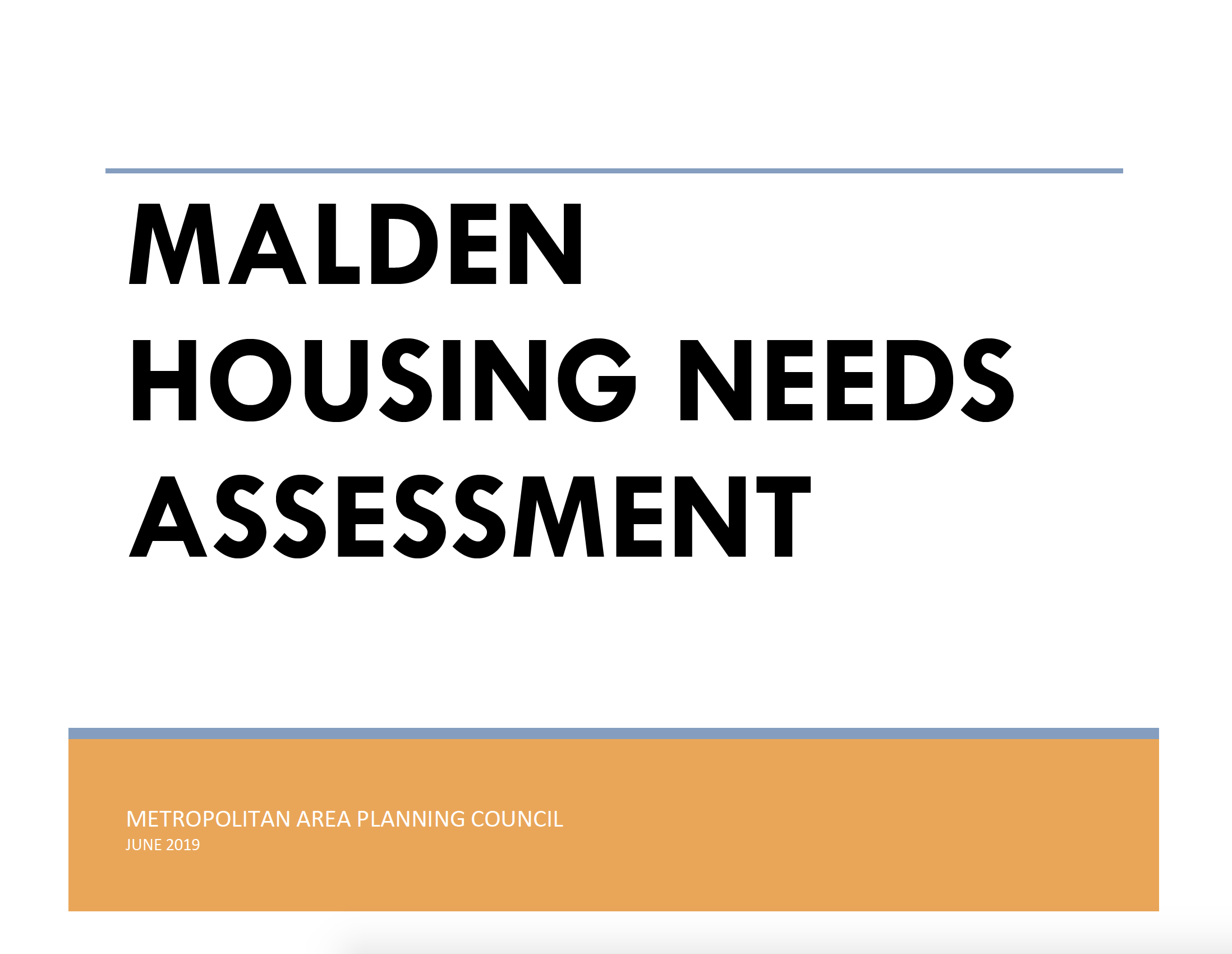Photo by Paul Hammersley
About

The City of Malden worked with the Metropolitan Area Planning Council (MAPC) to develop a Housing Needs Assessment that considers the community’s demographics, housing supply, and how well the housing meets the needs of residents.
This analysis, completed by MAPC, the regional planning agency serving the people who live and work in the 101 cities and towns of Metropolitan Boston, can be found here. The Malden Housing Needs Assessment indicates Malden has significant current unmet housing needs that are projected to increase in the coming decade. The lack of supply in the face of such strong regional and local demand for housing will likely continue to drive up prices, impacting some Maldonians’ ability to maintain their homes, meet their basic needs, support the local economy, and ultimately stay and thrive.
Malden Housing Assessment Needs Advisory Committee
The Advisory Committee (AC) helped guide the Housing Needs Assessment process.
Committee members responsible for:
● sharing local knowledge of community attitudes towards housing, housing need and demand, challenges and barriers to meeting demand, development trends, and development opportunity areas
● identifying stakeholders
● reviewing and providing input on the analysis
There are ten AC members, two of which are ex-officio members:
● Neal Anderson, Ward 7 Councilor
● Deborah Burke, Ex-Officio, Executive Director, Malden Redevelopment Authority
● Steven Finn, Executive Director, Malden Housing Authority
● Maria Luise , Ex-Officio, Special Assistant to Mayor Gary Christenson
● Karen Lynch, Mass Senior Action Council
● Josh O’Dor, Resident
● Michelle Romero, Malden City Planner
● Ose Schwab, Resident
● Anna Tse, YMCA Board, Community Preservation Committee
● Ryan O’Malley, Ward 4 Councilor
AFFORDABLE
HOUSING
Housing is considered affordable when it costs 30% or less of a household’s income and is deed-restricted to eligible low- and moderate-income residents. Affordable Housing has restrictions to preserve affordability for decades or in perpetuity, ensuring that lower-income households can stay in their communities without having to make difficult decisions, such as skipping meals or doctor’s appointments to have enough money to pay for their home.
Affordable Housing eligibility is usually based on the Metropolitan Area Median Income (AMI) calculated by the U.S. Department of Housing and Urban Development (HUD). The AMI for Malden is $107,800. Typically, households eligible for deed-restricted Affordable Housing must be at or below 80% of AMI. For a household of one, 80% AMI is $56,800; for a household of three, it is $81,100.
Learn about Affordable Housing:
Chapter 40B
The goal of Chapter 40B is to encourage the production of affordable housing in communities throughout the Commonwealth, especially those with less than 10% subsidized housing.
Chapter 40B is a state statute that requires municipalities to increase and maintain their Affordable Housing inventories at 10% of their total year-round housing stock. If Affordable Housing in a community is under 10%, developers may petition the local Zoning Boards of Appeals (ZBA) for a permit for housing developments with at least 20-25% Affordable units even though they do not fully comply with local zoning; the ZBA has limited grounds for refusal.
Through Chapter 40B, Affordable Housing has been produced that in most cases could not have been built under local zoning. Developments created under Chapter 40B include church-sponsored housing for the elderly, single-family subdivisions that include Affordable units, adaptive reuse projects, multifamily rental housing developments, and mixed-income townhouse or condominium developments.
Learn about M.G.L. Chapter 40B:
Subsidized Housing inventory (SHI)
The Massachusetts SHI is used to measure each community’s stock of low- and moderate-income Affordable Housing for the purposes of M.G.L. Chapter 40B. The SHI is determined as a percentage of the entire housing stock per the latest U.S. Decennial Census. The SHI is maintained by the MA Department of Housing and Community Development (DHCD).
Learn more about the SHI:
Safe Harbor
Communities have three mechanisms for claiming “Safe Harbor” from Chapter 40B development. Safe Harbor allows the ZBA to deny a developer a Comprehensive Permit.
- HPP Certification.
If a municipality has a locally adopted and state approved HPP and is making measurable progress toward reaching the state goal of 10% Affordable Housing by producing Affordable Housing units at an annual rate of 0.5% or 1% of its year-round housing units. (Safe Harbor is for a 1-year or 2-year period, respectively.) - 10% on the Subsidized Housing Inventory (SHI).
If more than 10% of a community’s total housing stock as counted by the U.S. Decennial Census is deed-restricted Affordable Housing. - 1.5% General Land Area Minimum (GLAM).
If 1.5% of the municipality’s total area zoned for residential, commercial, or industrial use is dedicated to deed-restricted Affordable Housing.
Currently, 10.1% of Malden’s housing stock is on the SHI, but the percentage will likely decrease following the 2020 U.S. Decennial Census because market-rate development did not often coincide with Affordable Housing production there past 10 years. Malden is investigating eligibility under the 1.5% land area criteria.
Learn more about Safe Harbor:
HPP glossary
The purpose of this glossary is to provide an accessible dictionary of housing-related terms that may be used throughout the HPP process and plan.
Past Meetings
Kick-Off Meeting
To launch this process, MAPC staff visited Malden in September to tour the city and talk with various groups. Through these focus groups, MAPC staff gained a greater understanding of the city’s current conditions, including housing stock, recent development trends, and issues pertaining to affordability and development impacts. Focus groups, a planning best practice, were invite-only and designed to allow a variety of voices to be heard.
November 5, 2018 | Advisory Committee Meeting
January 7, 2019 | Advisory Committee Meeting
July 8, 2019 | Housing Needs Assessment Meeting
MAPC staff presented findings from the Housing Needs Assessment and answered questions from Advisory Committee members and the public.

